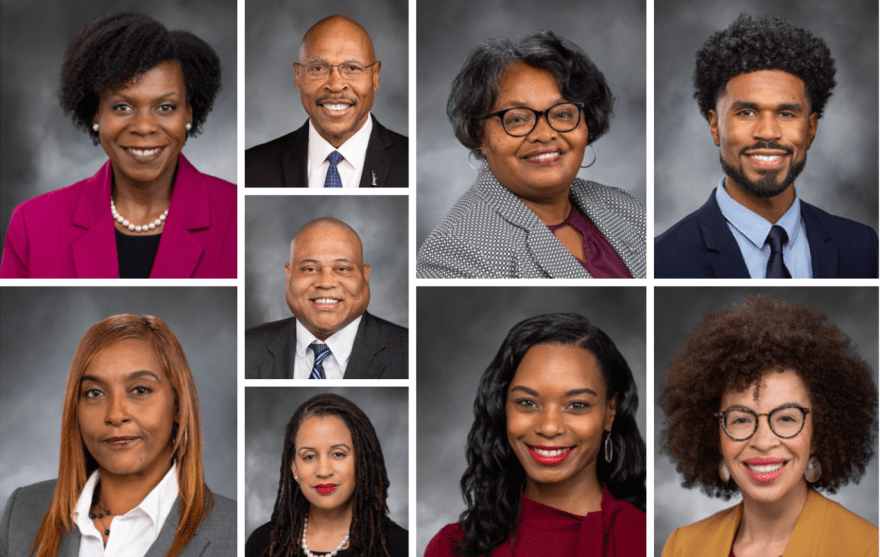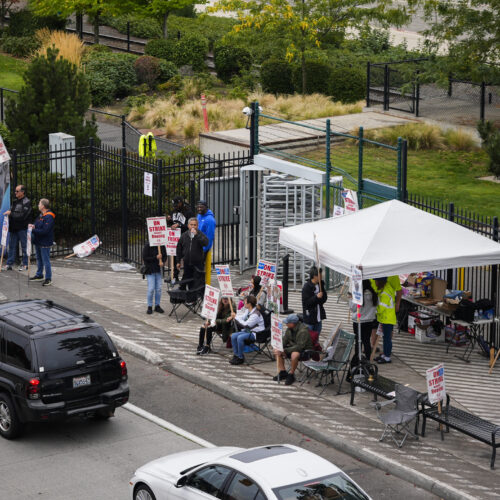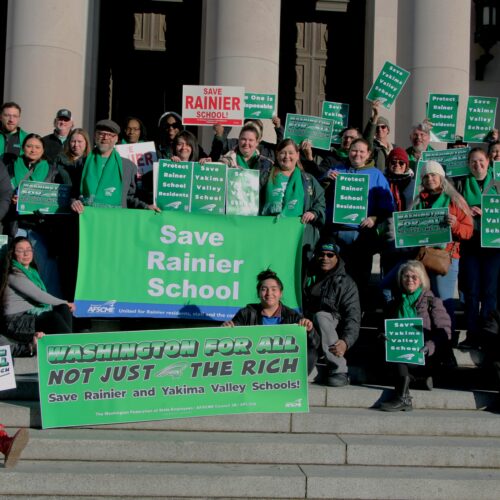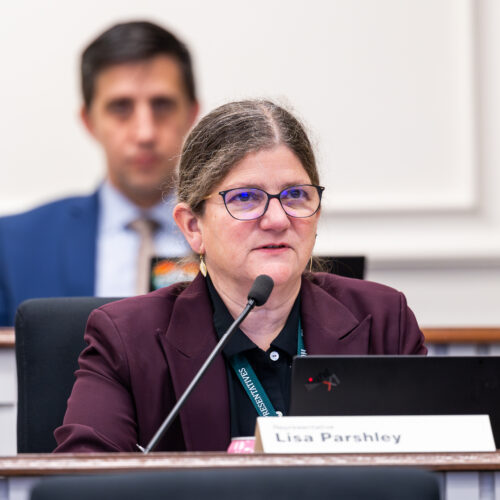It wasn’t that long ago that just three of Washington’s 147 state lawmakers were Black. Now there are nine Black members – eight in the House, one in the Senate — and they’ve formed their own caucus. All are Democrats. The growing racial diversity of the Washington Legislature comes at a time of racial reckoning and demands for police reform and other systemic changes. So how are these members changing the conversation at the state Capitol? And what policy changes are they seeking?
Over the past month-and-a-half the public radio Northwest News Network has engaged the members of the Black Members Caucus in conversation. (Note: State Sen. T’wina Nobles was unavailable.) Here are excerpts from those interviews, edited for clarity.
The Black Members Caucus nearly doubled in size this year and now has nine members. How is the caucus as a whole, and how are the individual members, changing the conversation and narrative around racial equity?
Rep. Melanie Morgan, Tukwila: I believe that the change started in 2018 in the state of Washington when we started electing more people to represent the actual communities that are there. Our Members of Color caucus [is] 19 members strong and our Black Members Caucus has nine. So that is the beginning. And with that we bring our life experiences to those tables, those inner circle tables to start changing legislation that affects the very communities that we’re representing. We can see that now we have passed the state equity office and the police accountability bills. Change has happened in the state of Washington by electing [diverse] representation.
Rep. Jamila Taylor, Federal Way (chair of the Black Members Caucus): I think we still have a significant amount of work to do on police accountability and police reform. I also think that we need to continue to work for the Black community to increase access to the economic development options and opportunities that are afforded to other communities in ways that we’ve been locked out of. We really also need to look at our education system and how is it serving our Black youth? Are we getting pushed out of the education system? So for me, it’s really trying to hone in on how all these policies interplay with each other, and how we have a holistic plan as we are working to address them, sometimes separately. And it is overwhelming.
Would you be comfortable sharing an example of how racism has impacted you?
Rep. Debra Entenman: What I can say is this: I come from a family of educated people. I am the daughter of a woman who had her own business when she was in New Orleans and married a person, came to the Pacific Northwest and got divorced. And when you divorce, it’s very difficult to navigate within systems. And when you’re a Black woman who’s divorced, it’s even harder to navigate within systems. I think about my own experience when I was in high school. I had a teacher who would ask me if I had written the papers that I had written. And he asked me once why I tried so hard and he said, “You know, it’s really going to be hard for you to rise above your background.” I was living in the Rainier Vista housing project at the time. It was the first teacher I ever had who I really felt didn’t like me and didn’t like me because I was African American. This was the first teacher I ever had who I didn’t feel was rooting for me. And that was really difficult for me.
Rep. John Lovick, Mill Creek (retired state trooper): I worked my tail off to join the State Patrol, worked my tail off to make it to the academy. I made it through the State Patrol academy. And there were three of us who were [people] of color, three Black [people] in our academy class. And I remember when I came out, I didn’t mind the fact that as a rookie you have to prove yourself to the older troopers; it was just one of those traditions that you had to prove yourself. And I think the thing that used to get to me as much and more than anything else was how difficult it was to just try and be one of the team members. I remember going out to coffee with guys and just to have them sit and talk to each other and not say a word to me. Or calling them up on the radio to ask if they were available for coffee and to have them say, “No, I’m not going to go right now.” Less than a minute later, I’d hear them sign out with another trooper. That used to bother me a lot.
What unites you with your colleagues of color and where do differences manifest themselves?
Rep. Kirsten Harris-Talley (vice chair Black Members Caucus): The Members of Color caucus and Black Members Caucus, respectively, we are not monoliths at all. We’re all individuals with individual lived experience. But there are some things in which we have common sensibilities. So knowing that we’re not a monolith, but that we have common experience where we can find ways to advocate with each other, the balance of that is something that’s really beautiful that I hope we keep seeing.
Rep. John Lovick: I’m listening to some tremendously talented young people coming up. You look at [Rep.] Jesse Johnson, you look at Rep. [Jamila] Taylor, they’re really wonderful people. And I don’t identify with maybe some of the terms that they use, but I also know that I need to listen and respect what they say. But it’s a process. It’s absolutely a different generation but people that I absolutely love and respect and admire tremendously.
What are your thoughts about efforts in the Legislature this year to pass police accountability measures and ongoing efforts to rebuild trust between police and communities of color?
Rep. Jesse Johnson, Federal Way (sponsor of a bill that banned chokeholds and other police tactics): Symbolically, we did a lot. But I think the work that we still have to do, that we started to touch on, [is] justice. It’s making sure that George Floyd never happens again, that Breonna Taylor never happens again, that Manny Ellis never happens again. And some of that work was accomplished through things like the tactics bill. But I think the justice work is long and it’s hard. And it’s not something that’s going to be solved overnight. I think we are just at the very beginning of that work. And we’ll see how it plays out. We’ll see if we have fewer deaths, fewer acts of violence by police. But I do think that Black lives matter a little bit more today than they did pre-session because there’s now systems of accountability to hold people responsible for the harm being done.
Rep. David Hackney, Tukwila: We cannot govern communities without their consent. We cannot police them without their consent. So we need them as witnesses, we need them as jurors, we need them to participate. And they’re not going to if there is a barrier of trust. So I do think there’s an opportunity to really work with both law enforcement and community stakeholders — including those most impacted by police violence — and to work with them to try to rebuild that trust. I think there’s an opportunity to reimagine how we police, how we fund it, how we organize it.
The term modern-day abolitionist is used more often these days. Do you identify as an abolitionist?
Rep. Kirsten Harris-Talley, Seattle: I am an abolitionist. The abolitionist movement started over 400 years ago in response to [the] very active transatlantic slave trade. Some of the most famous abolitionists are people like Harriet Tubman [and] Angela Davis in the 60s who currently still is an abolitionist in her work. So when I say I’m an abolitionist, I mean it quite literally, that I want to see an end to slavery, that our incarceration system is a way in which we still perpetuate slavery in this country, and that we need to have an alternative to incarceration. We need to invest upstream in the things that keep folks from having to resort to crime as a way to survive. We need to wrap care around folks in every facet of their lives so that we don’t need incarceration because it’s not actually a solution. It hasn’t fixed anything. It’s disappeared people into a system. So that’s what I mean when I say I’m an abolitionist. That means the lens that I have is building systems of care instead of incarceration and thinking through the alternatives to what we’re doing right now when it comes to people being wrapped up in these systems.
Rep. April Berg, Mill Creek: I don’t call myself an abolitionist. I do believe that we need to abolish modern day slavery, be it in our criminal justice system and be it around poverty in impoverished communities. So if you say, as a policymaker, do you want to abolish poverty? Do you want to abolish homelessness? Absolutely. But do I comport myself or call myself an abolitionist? I just don’t. That’s not something that resonates with me.
How should the state of Washington seize this opportunity to make the state more equitable, address systemic racism and, in the words of others, fulfill the promise of a multiracial society?
Rep. John Lovick, Mill Creek: We can’t be afraid to talk about Black and white and brown and blue. You know, I’ve had people say to me, “John, when I see you when I look at you, I don’t see race, I don’t see your color.” Well, that’s the wrong answer because if you’re not seeing me, you’re missing the boat. You’re not seeing and hearing what I have experienced. So, I think what we need to do to move forward is to just keep talking and keep walking but walk with our heads high and communicate with each other.
Rep. Jesse Johnson, Federal Way: I think one way that we can approach it is to create the conditions in which everyone can thrive, so your racial background or ethnic background, your gender or sexual orientation does not determine or predetermine your outcome in life. I think that obviously comes in the form of us passing policy that makes it a little bit easier to thrive and not just survive, and also to have access to opportunity. My focus moving forward is going to be three issues that I think are, aside from police accountability, the most important of our time, and that’s public health, housing and economic justice.
As you reflect on the successes of the 2021 legislative session and look to the future, what are examples of specific policies or bills that you expect to work on or introduce during the 2022 legislative session?
Rep. Jesse Johnson, Federal Way: I’m excited to be a part of a homeownership taskforce that focuses on homeownership for Black and brown communities with Sen. T’wina Nobles, and we’ll be leading that work this fall. I’m also a part of the juvenile justice partnership looking at how we create opportunity into the trades and into workforce development for young people coming out of the juvenile legal system. And I’m also part of a task force to bring African American history and Black studies to our high schools for the first time. So, I’m excited about all that work. I think it’s going to be a great opportunity to get us a little bit closer to where we want to be.
Rep. Melanie Morgan, Parkland (sponsor of a bill this year that made Juneteenth a state holiday): We have started something really good. And now it’s time to build upon it. I think we put a little piece of a foundation underneath in terms of police accountability. And then Juneteenth being the reconciliation, the healing bill going hand in hand. So, I would suspect that we would come back in 2022 and just expound upon more of those policies. The reality is that if this is a system that was built on racism that means there’s always going to be work to do to dismantle that in every area. And so for me, I’m going to be looking at civil rights, especially in terms of housing and health care. We know that investing in land brings wealth and so we need to create generational wealth in this community.
Rep. David Hackney, Tukwila: I had two juvenile justice bills that I introduced this year that were actually put on hold. One of them would prevent prosecutors from using criminal history points that you earned as a juvenile in adult court, and expanding the definition of juvenile to crimes that were committed under 25. Based on brain science, that’s the more appropriate definition of a juvenile. And secondly, giving juveniles that were sentenced to extremely long sentences for crimes committed under 25 an opportunity to see the Indeterminate Sentence Review Board (ISRB) after 20 years. I think we should give them a second chance after 20 years to present that to the ISRB. And then I will be looking for some instruments for homeownership as well as addressing homelessness, which I believe is a market failure. There is just not enough housing that is priced for low-income individuals because the developers make a higher profit margin on the higher end construction. We’ve got to find a way to incentivize or to do it ourselves.
Rep. Jamila Taylor: I am working on the response to the Blake decision, which is the Washington state Supreme Court decriminalizing simple possession of controlled substances. We want to move away from criminalizing substance use disorder, so we have to build up our systems. We cannot continue to arrest our way out of this challenge. My priority is to help build up the new system in collaboration with local government, the criminal justice system, lawmakers [and members of the] community. And so that’s my priority, to really address how we approach something that has historically harmed Black and brown communities in a disproportionate way, but is also hampering the progress of whole communities to respond to their own needs outside the criminal law context.
Rep. April Berg: There was a [housing] bill I co-sponsored [this year] with Rep. Kirsten Harris-Talley. It was an anti-displacement bill. And that actually was kind of paired with a potential wealth tax. I think those two things could be real game changers. The anti-displacement bill definitely would benefit marginalized communities, but it was going to benefit every community. If you own a house, you were going to get a benefit from this bill. Even if it’s incremental, I think that’s where we need to start at our next session in terms of finance reform.
Rep. Debra Entenman: For police reform, I know that I will be bringing back [my] independent prosecution bill (to create an Independent Prosecutions Unit within the Office of the Attorney General to investigate and prosecute crimes involving police use of deadly force), which I hope will be a model for other states. I would really like for us to look at qualified immunity (which protects police officers from individual civil liability). We should continue to move that forward because I think it’s going to be very important if we want fundamental structural change in policing.



















